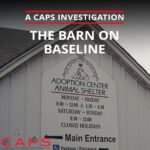CAPS and “Dateline” Uncover Puppy Mill Horrors
Story Also Reveals AKC’s and USDA’s Roles in Pet Shop Industry
“If Dante were writing today, there would be a special circle of hell for people who do this to young, helpless animals, who rely on them for their guardianship and everything else.”
Karen Overall, DVM
Director of the Behavior Clinic, University
of Pennsylvania Animal Hospital
“A Dog’s Life,” an expose of the multimillion dollar pet shop and puppy mill trade, aired on “Dateline” on April 26 and May 10, 2000. Viewers were shocked at the inhumane conditions at puppy mills that provide dogs to pet shops and appalled at USDA’s Deputy Administrator of APHIS/Animal Care, Ron DeHaven’s smug indifference to the horrid conditions at two USDA licensed facilities. They sent more than 9,000 letters and e-mails to NBC, the second largest response to any “Dateline” program in its history. “A Dog’s Life” won a Genesis award in the network news magazine category.
CAPS worked for more than a year with “Dateline” to prepare the in-depth report on pet shops and puppy mills. This well-researched piece focused not only on Petland – “Dateline” featured Bella’s story – and the puppy mills that deal with Petland and other pet shops but on the American Kennel Club’s and USDA’s roles in this tragic problem.
A significant portion of the “Dateline” story came from documentation and information provided by CAPS. We provided names of pet shop customers who purchased sick and dying puppies, photographs and video footage (hidden and camcorder) of USDA licensed facilities in Missouri and Iowa and Minnesota, CAPS investigation reports, USDA inspection reports, health certificates, broker invoices, Petland employee training tapes and manuals, and more. CAPS provided “Dateline” with crucial information on Puppy Ridge, a breeding/brokering facility in Missouri that ships dogs to many pet shops, including a number of Petlands. Puppy Ridge also brokers dogs to La Maison des Toutous (The House of the Doggies), a Flushing, NY store that was shown on the “Dateline” piece. “Dateline” did an on-camera interview with former Puppy Ridge driver, Sharon Williams. She and her husband, Bill, who had also been a driver, had originally contacted CAPS. “Dateline” interviewed a former Puppy Ridge kennel worker off-camera. She provided chilling information that wasn’t used on the “Dateline” report.
Reputable breeders will not sell to pet shops. In an interview with “Dateline” reporter Chris Hansen in New York City, CAPS board member Dr. Don Allen said, “The fact is here that pet stores have no other source of puppies other than puppy mills. If the three of us [referring to Hansen, Ingrid Newkirk of PETA and himself] were to start a pet store tomorrow and sell puppies and were only going to buy from local breeders, well we might have puppies this month. But we don’t have 16 breeds every day of the year.” Thousands of breeding facilities, most of them USDA licensed, provide a half-million puppies each year to pet shops across the United States and Canada. The parents of these puppies live in crowded and usually squalid conditions. Their sole purpose is to turn out litter upon litter of puppies. Chillicothe, Ohio-based Petland has 163 franchise locations in the U.S., Canada, France, Japan and Chile. Dr. Allen went undercover with Mr. Hansen to three Petlands in Ohio. At one of the stores, a salesperson assured Mr. Hansen that Petland only buys from reputable breeders. “They have to be inspected and licensed by the USDA,” she said. “And if the facility does not meet USDA standards, its license is revoked.”
In the past three years, however, the USDA has revoked only twelve licenses from more than 4,000 puppy mills. The USDA has been extremely negligent over the years in its enforcement of the Animal Welfare Act (AWA) as it pertains to commercial dog breeders and brokers. “Dateline” tried to show the conditions at a couple of federally licensed facilities to Mr. DeHaven. He refused to look at a tape of Nielsen Farms in Kansas or photographs of Joe McVeigh’s breeding facility in Missouri (put onto tape). Mr. DeHaven claimed a videotape does not always accurately depict the “real situation.”
Mr. Hansen asked Mr. DeHaven if USDA inspection reports depict the real situation. He provided the example of Joe McVeigh’s facility in Missouri. According to a December 1, 1997 USDA inspection report signed by Harold Becker, McVeigh had no non-compliant items. The local sheriff’s department raided McVeigh’s facility on January 20, 1998. Humane Society of Missouri employees and two sheriff’s deputies found seven dogs that had starved to death. “Dateline” showed viewers shocking photos of dead and starving dogs. “They found things like no food or drinkable water in any of the pens,” Mr. Hansen informed Mr. DeHaven. “Explain to me how one day there could be no problems with a breeding facility and a little over a month later there’s this.” The only response Mr. DeHaven could muster was “We don’t know what might have happened in the interim. When you have a third party looking at it, they might be looking at things differently. That’s not to say, and I’m not suggesting that dead animals that aren’t properly disposed of and those kinds of problems, I’m not trying to justify those.” He conceded that only half of all licensed breeders even meet the USDA’s minimum standards.
Harold Becker left the USDA at the end of 1998. In December 1999, the USDA charged Mr. Becker with violations of the Animal Welfare Act. He was operating as an animal dealer without a license. Mr. Becker told “Dateline” that he didn’t need a license to just transport dogs.
One puppy mill that USDA inspected for years without impunity was Nielsen Farms in Kansas. Behind the charming farmhouse, dilapidated kennels housed hundreds of dogs in inhumane conditions. More than 500 breeding dogs lived their entire lives on wire for one purpose: to breed. The female dogs were bred at every heat.
Veterinarian Dr. Karen Overall, director of the Behavior Clinic at the University of Pennsylvania Animal Hospital told Mr. Hansen that no reputable breeder breeds on every heat, yet puppy mills routinely breed their females as frequently as possible. “The dog is physically exhausted. The dog is unable to continue to replenish its stores to adequately supply nutrients to the next litter,” said Dr. Overall. “And, in fact, mothers who are stressed like this can’t provide the right kind of antibodies to their puppies to help protect them against infectious things.” She went on to say that well-bred puppies need good nutrition because it has a direct impact on brain development, affecting both health and behavior. And 90 percent of socialization, she noted, occurs during the first few months of life.
Spending their first eight weeks in puppy mills, the Nielsen Farm animals, like puppies from other mills, did not get the socialization needed to grow into happy, well-adjusted dogs. Dr. Overall said, “They can’t teach puppies to play because they don’t have any place to play. They can’t correct these puppies. There wasn’t the rich, warm social environment that these animals need to have to become mature. ”
At Nielsen Farms, neglect was rampant. Waste piled up. Food crawled with maggots. Water was non-existent or covered in green slime. Never allowed out of their cages, dogs developed severe behavior problems. Some of the dogs spent hours spinning around like tops in their cages. Other dogs paced back and forth across wire floors. A few jumped endlessly against the wire walls of their cages. Some of the dogs became aggressive and had bloody fights.
The neglect was long standing. Almost every Cocker Spaniel had “cherry eye,” a hereditary condition that must be corrected with surgery. A Jack Russell Terrier’s foot was trapped in broken wire. A Toy Poodle’s leg was accidentally broken when it was taken from its cage. A Labrador Retriever had a collar that was so tight his skin grew around it. The collar was cut off leaving an ugly scar devoid of fur. Dr. Overall told Mr. Hansen that every animal in the videos showed signs of neglect.
“Dateline” returned to Nielsen Farms about a month after they had been there undercover. Mr. Hansen showed the owner, Amy Nielsen, a tape of what they had found. Ms. Nielsen said, “What do you call a puppy mill? I have a breeding operation here. I have a kennel. And that’s exactly what it is. It’s a kennel.” She claimed conditions had improved since the video was shot, yet she refused to allow Mr. Hansen to see the animals. In fact, she angrily demanded that he leave.
The USDA finally charged Nielsen Farms, licensed since 1987, with numerous violations of the Animal Welfare Act. The facility auctioned off most of its breeding stock and moved to Arizona. According to “Dateline,” the Nielsens still have more than 100 dogs.
Carrie Carney and Pete Tunkey bought Bella, for $150 at the Petland in Tallahassee, Florida. The Petland employee denied that she came from a puppy mill. According to Mr. Carney, the employee “made it sound like she [the breeder] come in her little station wagon with the puppy in the back seat of the car.” Bella, however, was born in Missouri puppy mill investigated by CAPS in 1999. Honeydew Kennels, owned by The Hunte Corporation, one of the largest brokerage operations in the country, sold her to Petland. Although Petland represented her to be a purebred Alaskan Malamute with AKC papers, she turned out to be a mixed breed or as Mr. Tunkey said, “a mala-mutt.” When Ms. Carney and Mr. Tunkey held her at the store, she smelled of urine and her feet were covered with diarrhea. The store recommended a veterinarian who had given the dog a clean bill a health. But Bella was far from healthy. She had a severe urinary tract infection that lasted several months. She also had diarrhea and still experiences vomiting.
Petland eventually refunded the $550 purchase price as required by Florida law, but the couple incurred nearly $1,500 in veterinary bills. The Petland warranty provides two weeks for diseases and one year for hereditary problems. Dr. Allen informed “Dateline” that many hereditary problems are not readily apparent in the first year or so. At six month, Bella developed hip dysplasia and shoulder problems. She runs with a limp and may require surgery in the future. Hip surgery can cost in excess of $2,000 per hip.
Ms. Carney said, “If you ignore the fact that she’s an animal, you would return her.” He added that Petland offered this option months later. The employee told him to bring Bella back and get a new dog. “We’d already become attached,” Mr. Tunkey told “Dateline.” “I mean, once you have a dog in your house, she’s your little baby.”
Each week, when puppies are eight weeks old, as required by USDA regulations, and sometimes younger, they leave their wire cages at puppy mills. Brokers then transport the puppies by van, truck or airplane to pet shops throughout the United States and Canada. Sharon Williams, was a driver for Puppy Ridge, a breeding and brokering facility in Missouri that was also investigated by CAPS last year. She told “Dateline” that Puppy Ridge transported as many as 126 puppies in a single cargo van. Just before the Ms. Williams and her husband, Bill, quit in May 1998, they learned that Puppy Ridge was planning to send 160 puppies in the van.
According to Ms. Williams, the puppies were stacked in cages and the dogs on the middle level didn’t get enough air. She said that sick ones and healthy ones were jammed together. The puppies lived in their food and waste as it sloshed about the van, even though she and her husband tried to clean as best as they could.
Weather was also a problem. In the summer, Ms. Williams put a thermometer down behind the seat and it registered almost 120 degrees. “The puppies panted, and you had to stop and water them a lot,” said Ms. Williams. In order to adequately feed and water the animals en route, the Williamses had to put the back row of cages outside while they maneuvered around to care for the other puppies. Even in cold weather, they had to leave the back row of puppies outside while the other puppies received food, water and medication. The van didn’t have a secondary heat source.
Puppy Ridge sent sick puppies, including those with contagious illnesses, in the van to pet stores. Some of these puppies needed medication during the trip. The owner of Puppy Ridge didn’t want the Williamses to take sick puppies to a veterinarian if the animals required treatment while on the road. Ms. Williams said that she had to improvise, sometimes nursing sick puppies with Pedialyte she’d buy along the way. In her 15 months driving for Puppy Ridge, four puppies died. Puppy Ridge told her that was much better record than that of the drivers before her.
There is something that still haunts Ms. Williams. She nursed a sick puppy for thousands of miles. When she returned to Puppy Ridge, the owners told her to place the puppy in the trash/burn barrel. She refused to do this and left the puppy on the ground outside the office. This was the last time she saw the puppy.
The American Kennel Club, the elite of dog registries and sponsor of high-end dog shows, has a prestigious reputation according to “Dateline.” AKC registration papers that usually come with purebred pet shop dogs often impress buyers and provide a false sense of security. “Dateline” pointed out that any purebred dog, regardless of its health or condition can be registered with the AKC. Registration, however, does not guarantee proper breeding conditions, health, quality or claims to lineage. And the paperwork that comes with a pet shop dog may not actually be for that puppy. Mr. Hansen stated that “unscrupulous breeders will sometimes phony-up AKC papers to market their pups to pet stores at a higher price. Ms. Williams said that Puppy Ridge a simple solution for unregistered puppies that were rejected by pet shops. Her bosses instructed her to place the collar of another puppy with an AKC number on the neck of the rejected dog.
To test the integrity of the AKC’s registry, “Dateline” registered a litter of eight non-existent puppies with the AKC. “Dateline” claimed they mated a deceased Golden Retriever male with a spayed Golden Retriever female. The AKC sent individual registration forms. “Dateline” used two of the forms to register real animals. “Dateline” received two registration certificates and gold-sealed AKC pedigrees certifying the animals were Golden Retrievers. The animals, however, were not puppies but two 13-year-old cats. The AKC imposed a suspension of five years and a fine of $1,000 on the producer of the “Dateline” story. CAPS president, Deborah Howard, who had provided registration information for the deceased Golden Retriever, was suspended for five years and fined $2,000. The AKC cannot enforce these fines since it is a nonprofit organization and not a court of law. Those who pay the fines are seeking reinstatement.
CAPS contacted NBC affiliates about doing tie-in stories to the “Dateline” report. WREX in Rockford, Illinois and KCAL in Lancaster, PA did stories about customers who had purchased sick puppies from area Petlands. WTTC in Rochester, Minnesota featured Marina and Scout, two of five puppies that CAPS rescued during an investigation of more than 25 USDA licensed facilities in four states. The story showed Marina and Scout in their new homes and took viewers on a tour of Paws & Claws, the no-kill shelter that housed the puppies after their rescue by a CAPS investigator.




